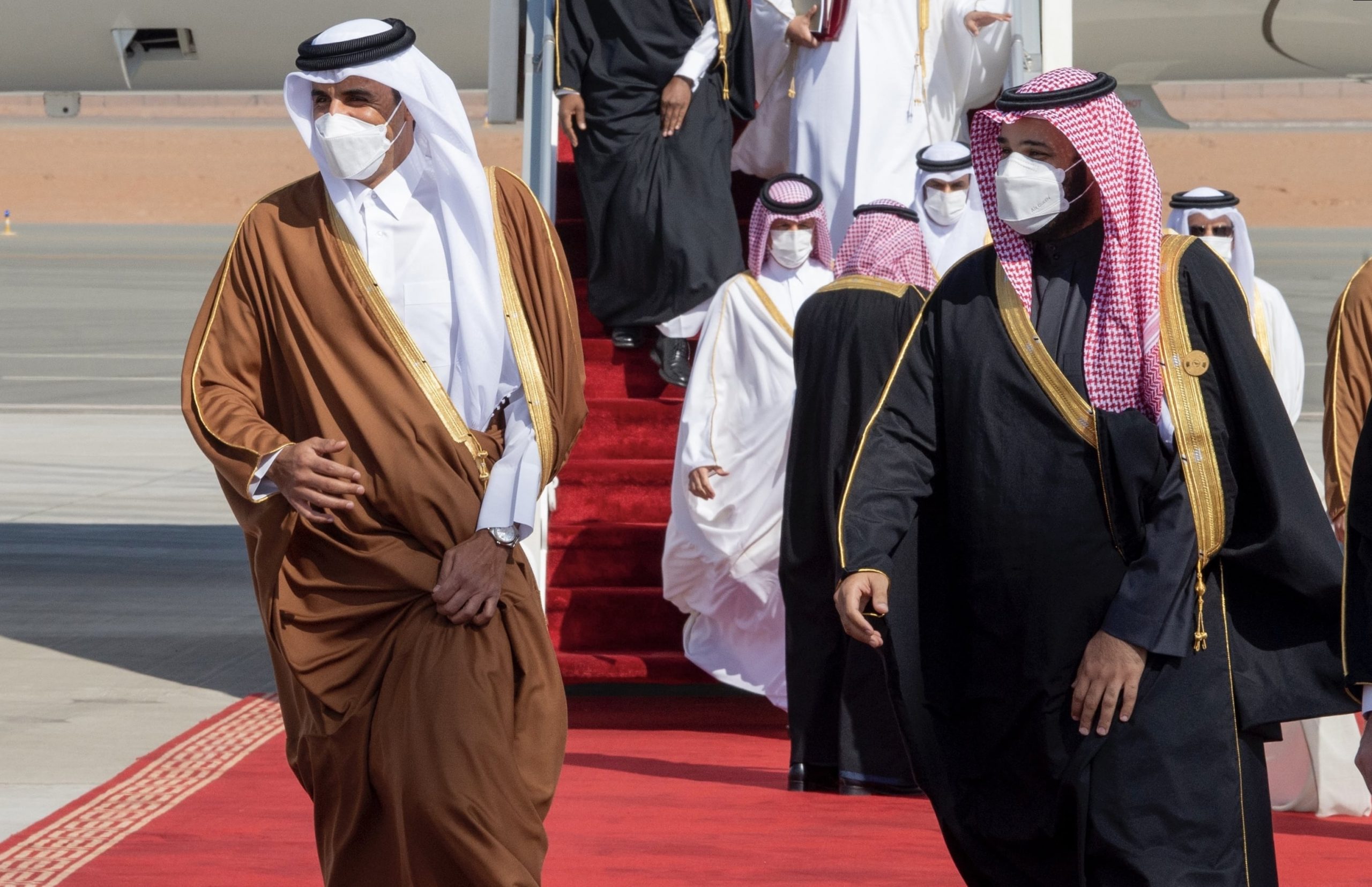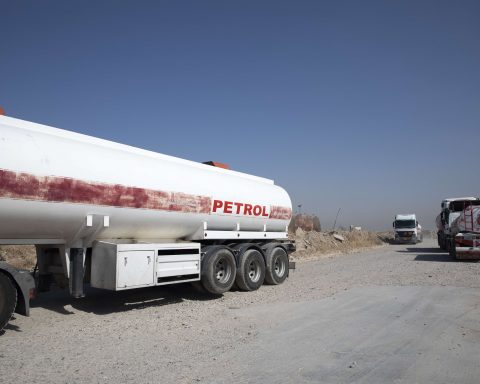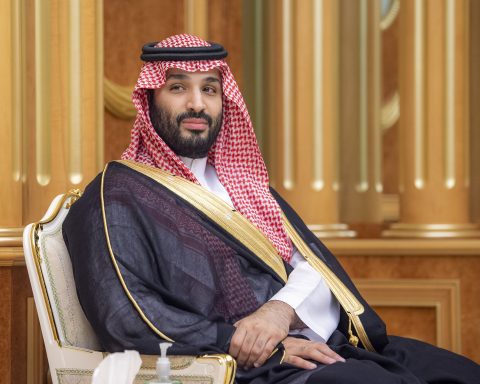Saudi Arabia’s Crown Prince Mohammed bin Salman’s warm welcome and tight hug with the Qatari Emir Sheikh Tamim bin Hamad Al Thani, who came to Saudi Arabia for the 41st Gulf Cooperation Council (GCC) Summit, brought to mind the proverb “if you cannot beat them, join them”. Although it may be indicated that this attitude of Mohammed bin Salman, regarded as one of the leaders who led the blockade against Qatar, is far from sincere, it can also be evaluated as looking for a way out of the situation in which he is in. It is known that Mohammed bin Salman, whose reputation has been gradually decreasing at the national and international level since the murder of journalist Jamal Khashoggi in 2018, is worried about the legal processes that will possibly target him when Joe Biden takes office in the US as the president. These developments, which prepared the ground for the end of the blockade against Qatar at least on paper, resulted in the end of the blockade process, with Saudi Arabia leading the way and the support of other countries, either willingly or unwillingly.
Although the crisis seems to be resolved, the fact that the United Arab Emirates (UAE), Egypt, and Bahrain did not participate at the level of heads of state, and that the official media channels of these countries have a very limited news flow about the end of the blockade, reveal that there could be no genuine change in the policies of these actors against Qatar. On the other hand, it seems difficult for Qatar, the victim of the blockade, which in some ways is “humiliating”, to bear what has happened. Besides, the 41st GCC Summit was seen as the development that ended the embargo against Qatar since 2017, while it was also a meeting that demonstrated that Qatar overcame the crisis thanks to its strong will. Before going into the details of the meeting, it will be useful to briefly recall the background of the Qatar crisis and the process.
The Process of Qatar Blockade
The Gulf region, which has started to rise in Middle East politics since the 2010s, has made a significant advancement in terms of regional organization with the GCC, which reflects an important cooperation platform and common political culture for a long time. Besides, differences between the Gulf states continued, especially in the field of foreign policy. Among the GCC countries, while Saudi Arabia, UAE, and Qatar followed an intense and active foreign policy, the foreign policy strategies of Kuwait, Bahrain, and Oman continued with a lower intensity and passive pace.
Political and ideological differences that were prompted by the developments in Tunisia in December 2010 and were shaped by the reactions to the popular uprisings that spread to other countries of the region caused the existing policy differences among the Gulf States to deepen. In 2014, Saudi Arabia, the UAE, and Bahrain withdrew their ambassadors in Qatar by putting forward these policy differences and arguing that Qatar did not fulfill its obligations and caused a diplomatic crisis. This crisis, which lasted for about a year, ended with the following GCC Summit, with the effect of regional and global developments. While these three countries targeting Qatar’s foreign policy maintain their attitude towards Doha secretly, this time in 2017, they followed a much sharper policy and took a series of severe decisions including land, air, and sea blockades against Qatar. Accusing the Doha leadership of “funding terrorism,” Riyadh, Abu Dhabi, and Manama together with Cairo launched a blockade, on June 5, 2017. After about 3.5 years from June 5, 2017, to January 5, 2021, the crisis between Qatar and blockading countries ended on paper with the 41st GCC Summit.
Before the Summit
Before the summit, the negotiations between Saudi Arabia and Qatar, under the mediation of Kuwait, had reached a certain point in the resolution of the crisis. One day before the GCC Summit, on January 4, Kuwaiti Minister of Foreign Affairs Ahmed Nasser Al-Mohammed Al-Sabah announced that the land, air and sea borders between Saudi Arabia and Qatar would be opened from January 5th, based on the information he received from the Emir of Kuwait. With this development, the announcement by the Qatar News Agency that Emir Tamim bin Hamad will also attend the summit increased the rapprochement before the GCC Summit and this step was considered as a confidence-building measure.
Saudi Arabia’s Crown Prince and Defense Minister Mohammed bin Salman, Emir of Kuwait Sheikh Nawaf Al Ahmad Al Jaber Al Sabah, Prime Minister of the United Arab Emirates and Ruler of Dubai Mohammed bin Rashid Al Maktoum, the Prime Minister and Crown Prince of Bahrain Prince Salman bin Hamad bin Isa Al Khalifa, the Deputy Prime Minister for the Council of Ministers in the Sultanate of Oman Sayyid Fahad bin Mahmoud Al-Said and Qatari Emir Sheikh Tamim bin Hamad Al Thani attended the 41st GCC Summit, held in the city of Al-Ula in the northwest of Saudi Arabia. The representation of Qatar, which has been participating in the summit at a low level since 2017, by Emir Tamim bin Hamed at the summit in 2021, marks a turning point in the Gulf crisis and has a symbolic meaning.
Timing of the Normalization
The timing of ending the blockade and the Gulf crisis, which has been causing financial and political damage to all parties, is also significant. It would not be wrong to say that the political normalization initiative of Saudi Arabia, which hosts the 41st GCC Summit, are actually caused by the difficulties in its foreign policy and economy. The timing, which largely reflects the moves of Saudi Arabia at the foreign policy level, can be explained by the fact that Donald Trump will hand over the White House to Joe Biden following the result of the 2020 US Presidential Elections. It can be said that allies such as Saudi Arabia and UAE, who found wide maneuvering areas in the Middle East in foreign policy during Trump’s term, will have more limited space under Joe Biden’s administration.
Following the murder of Khashoggi in 2018, Saudi Arabia and especially Mohammed bin Salman, who had tensions in their political relations with Western countries, sought a solution strategy by visiting Asian countries. In addition to the Khashoggi murder, Saudi Arabia, which could not achieve its desired goals as a result of the intervention initiated in Yemen in 2015 with its adventurous foreign policy, had to face the Houthi threat with the UAE’s military withdrawal from Yemen in February 2020. In addition to the unsuccessful political moves, with the emergence of the new type of coronavirus (COVID-19) pandemic at the end of 2019, the first decline and then the cessation of tourism activities, as well as the deterioration of the economic sectors and the drop in oil prices, damaged the Saudi economy more than expected. In the light of these developments, Saudi Arabia, which reached a political and economic impasse, started to prepare for the Biden administration towards the end of 2020, has again given positive signals in its relations with Turkey and a meeting has taken place between the two foreign ministers Çavuşoğlu and bin Farhan. Besides, attempts were made to resolve the Gulf crisis, and negotiations were held under the Kuwait mediation. With the establishment of a new cabinet in Yemen, the moves to prepare for the Biden era were completed.
After the Summit
After the summit, the participants demonstrated that they reaffirmed their belief in the political and economic unity of the Gulf by signing a deal called “Solidarity and Stability”. Although it was signed in a sensitive stage, this agreement can be regarded as a promising development for the future. Besides, it will not be easy to heal the wounds of the blockade process, which seriously undermined the sense of trust and solidarity among the Gulf States.
More important than this historic summit is the issue of how to define and implement the solidarity and stability among the participating countries. The registration of the softening signals between Saudi Arabia and Qatar at the GCC Summit in front of all member countries and those based on the organization symbolizes the end of the crisis on paper. However, rather than the developments on paper, the will to ensure trust in bilateral relations seems more important besides the solidarity and stability within the organization.
The fact that the bilateral relations between the UAE and Qatar are going through more tense periods than ever before during the crisis, and the specific requests to Qatar by ignoring Qatar’s sovereignty, shows that at least the trust bonds between Abu Dhabi and Doha cannot be established very soon. On the other hand, the key theme of the deal signed at the end of the 41st GCC Summit is that Qatar, which survived the blockade period with minimum damage, is strongly and more independently participating again in both the geopolitics of the region and the balance of power in the Gulf.
The Turkish version of this article was published by Anadolu Agency on January 6, 2021.













